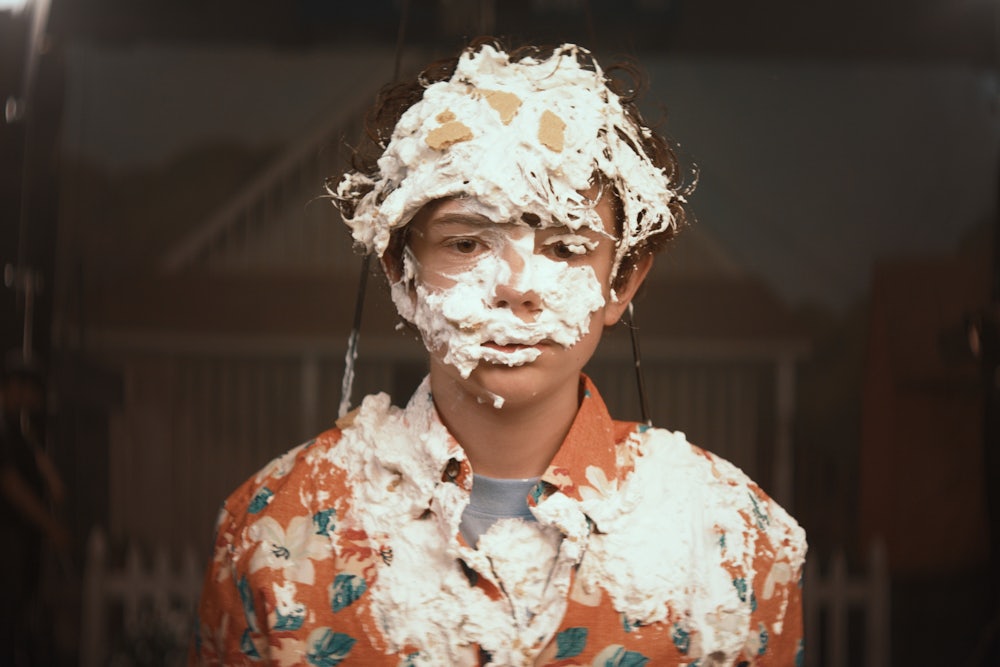People who make movies love to make movies about the people who make movies. I suppose it makes sense; “silver screen” is another way to describe a mirror. Honey Boy is director Alma Har’el’s movie, but people talk about it as Shia LeBeouf’s, not just because he wrote it and stars in it, but because it’s so obviously based on his life that it’s less entertainment than exorcism.
LeBeouf, now 33, has been working in Hollywood since he was twelve. He’s adhered thoroughly to the familiar script of the child star: first adored, then aged out of sweetness into an adult actor without a trace of baby fat, then disgraced, now reincarnated. Or at the very least repentant—you could think of Honey Boy as the eighth step of the twelve AA recommends, a request for forgiveness, for the performance art provocations, the I’m-a-serious-actor-shenanigans, the predictable skirmish with the law. Honey Boy is deadly earnest in documenting the arc just described: a portrait of the artist as a ruined young man.
The first shot of the film gives us Otis (Lucas Hedges), a twenty-something blockbuster star, tethered into cables like the marionette he is; the film then winds back to show us pre-adolescent Otis (Noah Jupe) and how the boy became the man. The script only sketches in the adult Otis—glimpses of the various roles he inhabits, his rowdy off-screen behavior—before dispatching him to rehab. The film understands that the adult is less interesting than the child, which is unfortunate for Hedges, who is left with little to do but brood. The compelling characters here are young Otis, avatar for young LeBeouf, and James, his terrible hanger-on stage dad, played by LeBeouf himself.
That LeBeouf has morphed into tabloid caricature is especially poignant given his talent as a performer. As a child, he was near savant; charismatic, funny, sweet. His generation first came to know him as the charming dork Louis on a forgettable Disney series called Even Stevens. In his adolescence, he led the cast of the big screen adaptation of Louis Sachar’s beloved young adult novel Holes. These were entertainments for children, an audience often indifferent to quality (though in 2003, A.O. Scott did call Holes “the best film released by a major American studio so far this year”). But if you revisit either of these, LeBeouf’s star power—and his comic timing—are indisputable.
LeBeouf was always cute, but Jupe is a beautiful child. Honey Boy condemns a system in which children labor for a stardom that will inevitably destroy them, and does so on the strength of, well, a child. Jupe’s Otis is often shirtless, and this sometimes seems innocent and sometimes just what we expect of a teen idol. In a subplot that’s icky at worst and ill-advised at best, he finds comfort (maternal or erotic, you tell me) in the arms of a young prostitute (the pop star FKA Twigs) who is his neighbor at the seedy motel where he and his dad live. Of course Hollywood turns children into sex objects, but Honey Boy critiques that unfortunate reality by perpetuating it.
It’s hard to watch LeBeouf play what I can only assume is a faithful depiction of his father: potbellied, mulleted, sporting the least flattering eyeglasses known to man, full of bluster as he reminisces about his glory days as a rodeo clown. He’s both loving and terrifying, protective of his son as a miser would be of any asset. When he bursts onto a set to interrupt a shoot that’s gone into overtime, you can almost believe that he’s more concerned dad than jealous interloper. James is plainly demeaned by his son’s burgeoning success, the very thing for which he’s worked so hard. There’s love there, but there’s also anger, envy, and shame, as he mocks the size of his son’s penis, urges him to rehearse, allows him to smoke and take drugs. LeBeouf is carrying violence within him from the moment he struts onto screen, but still we wince when it erupts. Did he find catharsis in this? It’s almost like the role-playing exercise a therapist would recommend.
The child star’s lot is untenable because they must perform an innocence that’s simultaneously sacrificed upon their becoming performers. Go to any playground and watch as toddlers (who know nothing!) hold still for their parents’ iPhone eye. The child performer’s instinct is only to please an adult. (Forget about the money, if you can.) Two decades on, LeBeouf still seems to want to please, both audiences and his pop. Honey Boy isn’t a hit job but a reckoning. The movie has some music video visual flourishes, but it’s still a serious and even affecting work. One of the most poignant moments of abuse is when James taunts his son with the line “You lie for a living.” That’s the conundrum, as old as the boy who cried wolf. Is this movie true or is everything an actor says ultimately dishonest?
The film closes with snapshots of LaBeouf with his dad; manipulative, sure, but also unsettling. Watching LeBeouf embody the man who tormented him—in his account of it, anyway—is harder than watching him in flagrante delicto in Nymphomaniac. But LaBeouf is still, decades on, a pleasure to watch; I hope, for him, more opportunities to perform. He lies for a living, yes, but he’s good at it.
